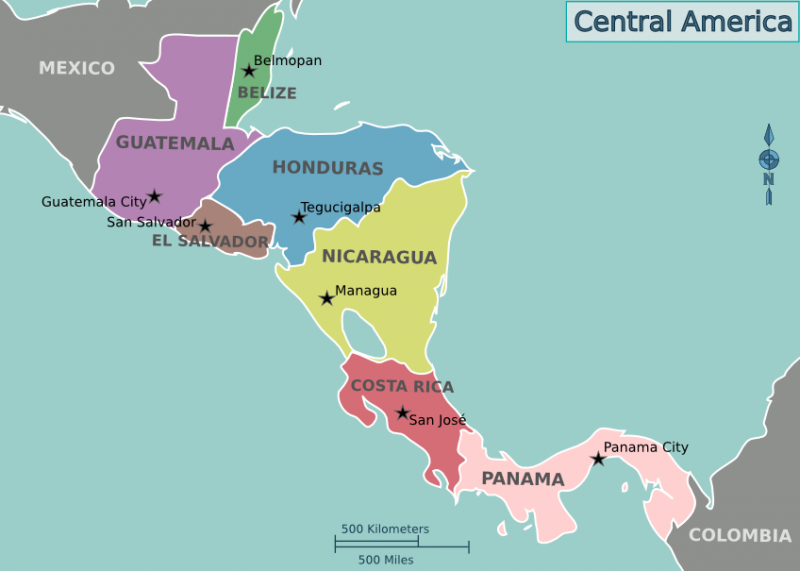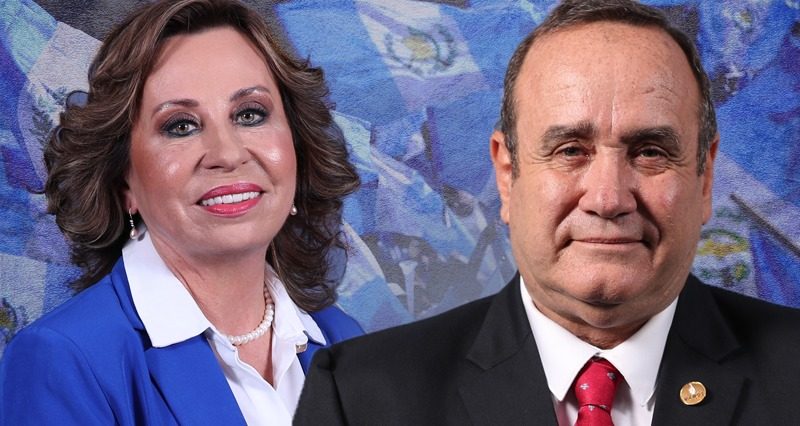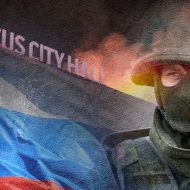Guatemala is currently holding the second round of its presidential elections. With about 98% of polling places reporting, it seems that Giammattei had about 58% of votes, compared to about 42% for Sandra Torres. The first round took place on June 16 (parliamentary and presidential).
The winner will be tasked with managing the most populous country in Central America and its ongoing economic crisis. How well the situation is handled is important not only domestically, but also well beyond the country’s borders, as Guatemala remains the largest source of migrants traveling to the US-Mexico border. Will the winning candidate be able to cope with these challenges?
¡Gracias Guatemala!
La confianza que depositaron en mí será el motor para seguir nuestro camino por una Guatemala diferente. Hoy me convierto en el primer servidor público de la nación y junto a todo el país vamos a trabajar por hacer el gobierno que ustedes se merecen. pic.twitter.com/drAOIFlsj5
— Alejandro Giammattei (@DrGiammattei) August 12, 2019
Details
During the elections, voters will choose the president, 160 members of congress, 20 members of Parliament and 340 mayors. Guatemala’s elections have a two-round system.
Current president Jimmy Morales his met his term limits and will not be able to run again this year.
Candidates and Ideas
The primary candidate for the presidency was Sandra Torres from the National Union of Hope (a Social Democratic party). Her opponent was Alejandro Giammattei from Vamos (a center-right party).
Torres promises health and education reform. Curiously she has changed her positions on some social issues; having once supported abortion and the LGBT movement, she now seems to express opposing ideas, emphasizing the importance of “principles and values.”
“Look at us. We are a people with principles and values which we protect. For that reason, we are completely against same-sex marriages for men and women. We are against abortion. We are against the immoralities that flood our society. ”
Alejandro Giammattei has even more right-wing positions on these issues.
Intrigue
Liberal media sources such as CNN reported that US President Donald Trump is closely monitoring the elections, as they directly relate to the hot button migration issue. CNN notes the next president of Guatemala will likely be put under tremendous pressure from the Trump and his administration, as one of his campaign promises to resolve the migration issue.
Why are liberal media outlets so hostile?
The next president of Guatemala will be able to decide the fate of the agreement between Trump and Morales that was made late last July (the so-called “Safe Third Agreement”). The deal has not yet been ratified in Guatemala, meaning the responsibility will rest on the shoulders of the new head of state.
The agreement attempts to foster policies that restraint migration flows and create barriers to relocation. According to the document, the US will be able to reject asylum applications for migrants traveling north from Honduras and El Salvador (as well as from Africa, India, Asia and South America) because they refused to seek asylum in Guatemala.
Opponents argue that the deal is disadvantageous to Guatemala, where the crime level is already extremely high, and the population size is already several times greater than in neighboring states. Guatemala is one of the most populous countries in Central America with almost 17 million people living there (compared with El Salvador – 6 million or Honduras – 9 million).
The country’s economy is so weak that a new influx of migrants could serve to push it over the edge.
Proponents of the deal, however, believe that there are upsides as well. Firstly, Mexico will be able to repatriate migrants who refuse to seek asylum when passing through Guatemala.
Secondly, America will provide financial assistance to Guatemala and Mexico in return. The deal could also help to curb smuggling and drug trade through South America.

Wikimedia Commons
Who needs an agreement?
Frankly speaking, the deal is in the interests of the United States and is in line with Trump’s election promises. The Guatemalan National Migrant Relief Council estimates that around 1.5 million Guatemalans live in the United States. Of these, only 300,000 to 400,000 have a legal residence, which worries many Americans.
Critics have questioned whether Guatemala has the resources to handle the surge in asylum applications that would come as a result of the deal.
Positions on the Migration Agreement
Torres and Giammattei have each questioned Morales’ authority to sign the deal. Torres has tweeted the hashtag NoAl3erPaisSeguro (No to Safe Third Country). She has said that the agreement should not be ratified because “we do not have many resources for our own people, much less can we keep foreigners here and give them attention”
While Giammattei did not rule out the possibility of agreeing to the deal, he has strongly criticized Morales. “As a safe third country, we can’t take care of our own, much less those from other countries. #ConcluGuateUSA,” he said
Torres and Giammattei have, for the most part, avoided taking strong positions on the agreement.
The former first lady said that it should be ratified by Congress, while Giammattei said he did not know enough about it and said that he would study it in more detail if elected.
At the same time, both candidates focused their campaigns on combating deep-rooted corruption and promising to improve education and healthcare, as well as investing in poorer areas to reduce poverty. The main slogans of the election cycle are against corruption.
Corruption is a central problem in the minds of Guatemalan voters.
Torres said she would deploy an armed force to fight crime and remove prisons from cities. She also suggested making prisoners work and invest in the economy.
Giammattei said he would reopen a bill declaring gang members “terrorists,” barring them from marrying in prison and forcing them to work.
Economy
The economic situation in Guatemala is difficult. The GDP (as of 2017) was at 68.2 billion dollars, and about 60% of the population is below the poverty line.
The World Bank notes that although Guatemala has the largest economy of the seven Central American countries, it also has the most severe poverty rates.
The economy of Guatemala is based on agriculture. The main resources in the country are sugarcane, bananas, coffee, corn, cardamom, etc. These products are exported (primarily to the United States, neighboring Salvador and Honduras, and also to Canada).
Guatemalans import transport, fuel, building materials, electricity, as well as fertilizers and grain (from the USA, Mexico, China).
Skepticism from the population
A large number of voters in rural Guatemala doubt that the elections will bring much-needed changes like higher wages or better opportunities for the poor.
People are skeptical of the elections for good reasons – the lack of opportunities has led to the emigration of tens of thousands of people, yet, none of the candidates are seriously raising the issue.
Guatemalans told voters that their main concern was insecurity, saying that combating high crime rates and armed attacks should be a priority for anyone who wins the election.
Background: Brutality of US intervention
Regardless of Trump’s position, remittances from Guatemalans to the US are an important part of the economy, reaching a record $ 9.3 billion last year. The country’s export revenue is only $10.5 billion. According to the World Bank, remittances account for 12% of the country’s GDP.
Guatemala’s previous experiences with Washington has fueled many citizens with distrust and hatred for the US.
After 1944, when the Guatemalan authorities sought to pursue a policy independent of the United States, they carried out a number of socio-economic reforms and transformations, including the adoption of a Labor Code, social insurance measures, laws on the protection of national resources, etc.
The United States was worried about the “rising communist sentiment” and capitalist prospects in the region. When it came to the nationalization of production, the United States, which owned the United Fruit Company, decided to carry out a coup to secure its interests. The first unsuccessful coup attempt was carried out by Colonel Armas with the support of the UFC and the US and Nicaraguan embassies in Guatemala. Then, the United States organized a large-scale “information war” and made significant efforts to internationally isolate the Guatemalan government, while imposing economic sanctions.
The U.S. Department of State accused the Guatemalan government of secretly supplying arms to neighboring countries (essentially falsifying the situation, as it is now doing in the Middle East), and in 1954 the CIA carried out a special operation PBSUCCESS to invade Guatemala and carry out a bombing campaign. The Americans have always acted to keep loyal candidates in power.
After the bombing, the authorities almost completely eliminated the socio-economic transformations that had been implemented so recently. The pro-US dictator, José Miguel Ramón Ydígoras Fuentes, a former military attaché in Washington, led the country during a long-term civil war, where more than 200,000 people were killed. He always inaugurated hostile policies towards revolutionary Cuba.
The United States invested heavily in Guatemala at that time – militarily and financially, calling the patriotic partisans fighting the government the “main threat”. The United States trained government forces to fight the guerillas, supplied it with weapons, handled infrastructure and sent in military advisers.
Trump’s negotiations with Guatemala are of a pragmatic nature. Each side is trying to act in its own interests, and not necessarily in accord with globalist demands. The migration deal may not appeal to local residents, and it may even cause tensions between the United States and Guatemala – but at least it is an attempt to come to some kind of agreement. It is possible that the United States will introduce sanctions against the country if the new leader attempts to fight against the agreement. Washington needs to take some action to curb migration flows.
Guatemalan authorities agreement or disagreement with Trump will obviously affect their hold on power and how long they stay in office themselves.









Leave a Reply